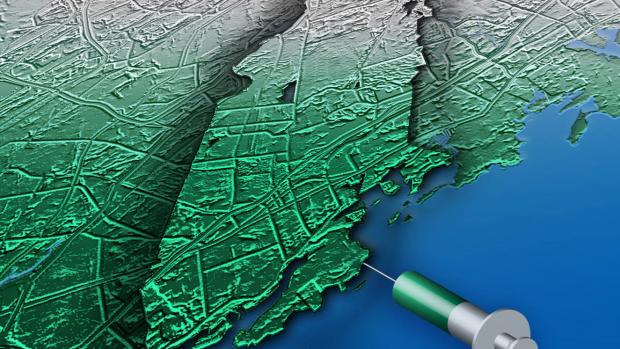New model shows how cities can safely lift COVID-19 restrictions
Model can serve as a blueprint for areas with low vaccine rates.

BROOKLYN, New York, Monday, August 2, 2021 – According to the Centers for Disease Control and Prevention (CDC), over 57% of people in the U.S. 12 years of age and older are fully vaccinated against COVID-19. While the high vaccination rates in certain areas are helping local authorities to safely reopen, there is no consensus on a common approach, particularly as the Delta variant spreads. Furthermore, areas with a vaccine-hesitant population, or ones with less access to the vaccine must still take a cautious approach to lifting or potentially reinstating restrictions.
To help public health officials create a data-centric approach to reopening towns, Maurizio Porfiri, Agnieszka Truszkowska and Zhong-Ping Jiang from the NYU Tandon School of Engineering, expanded on an agent-based model (ABM) they developed in January this year to predict the spread of COVID-19. The improved model offers accurate treatment of human mobility to capture the epidemiological implications of gradually reopening the economy. By considering a vaccination rate of about 0.5% of the population per day, the researchers determined that increasing access to social gatherings in leisure locations and households, public transportation and work environments at a 1% daily rate would lead to a nearly 30% increase in fatalities within the next three months. However, they also demonstrated that a vaccination rate of at least 1% population per day would support a safe, rapid reopening, a demonstration of the critical role the vaccine roll-out plays in safe reopening of population centers.
The study, “Designing the Safe Reopening of US Towns Through High-Resolution Agent-Based Modeling,” in Advanced Theory and Simulations, was conducted in collaboration with researchers from Northern Illinois University (Malav Thakore and Sachit Butail), University of Groningen (Lorenzo Zino), Università Cattolica del Sacro Cuore (Emanuele Caroppo) and Politecnico di Torino (Alessandro Rizzo).
“This model provides additional evidence to support the need for rapid vaccinations before areas can open safely,” said Porfiri. “Areas with low vaccination numbers, under 1% of the population per day, should express extreme caution with their strategies to open up the economy and should focus their efforts on increasing the rate of vaccinations.”
The research specifically focused on the town of New Rochelle, located in Westchester County in New York State. The ABM replicates, geographically and demographically, the town structure obtained from U.S. Census statistics and superimposes a high-resolution — both temporal and spatial — representation of the epidemic at the individual level, considering physical locations as well as unique features of communities, like human behavioral trends or local mobility patterns. While New Rochelle’s high vaccination rates make this model no longer relevant to advise on the town’s plans to reopen, the model can be used to inform public health decisions in towns that are lagging in their vaccination campaigns.
This research was funded with the support of the National Science Foundation and Compagnia di San Paolo.
About the New York University Tandon School of Engineering
The NYU Tandon School of Engineering dates to 1854, the founding date for both the New York University School of Civil Engineering and Architecture and the Brooklyn Collegiate and Polytechnic Institute. A January 2014 merger created a comprehensive school of education and research in engineering and applied sciences as part of a global university, with close connections to engineering programs at NYU Abu Dhabi and NYU Shanghai. NYU Tandon is rooted in a vibrant tradition of entrepreneurship, intellectual curiosity, and innovative solutions to humanity’s most pressing global challenges. Research at Tandon focuses on vital intersections between communications/IT, cybersecurity, and data science/AI/robotics systems and tools and critical areas of society that they influence, including emerging media, health, sustainability, and urban living. We believe diversity is integral to excellence, and are creating a vibrant, inclusive, and equitable environment for all of our students, faculty and staff. For more information, visit engineering.nyu.edu.




